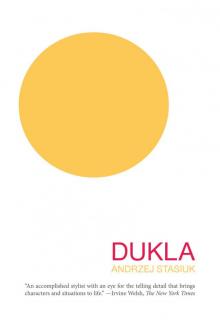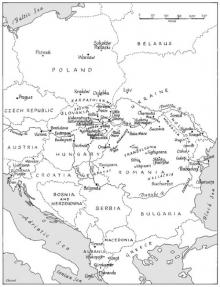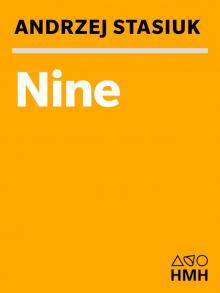- Home
- Andrzej Stasiuk
Dukla Page 13
Dukla Read online
Page 13
I took a step forward. I wasn’t afraid. After all, it’s hard to fear something that doesn’t know you exist. My fingers in my pocket could feel a pack of cigarettes and some warm coins.
At that moment I heard a rustle from the direction of the vestibule. A slight figure appeared out of the shadows. It was the shaven-headed girl with the slogan on her T-shirt. She was carrying a small backpack. She passed by going down the nave, but I must have moved, because she noticed me and turned around. This time she was wearing an army jacket with a turned-up collar.
“I didn’t think anyone was here,” she said softly.
“Actually, there really isn’t,” I answered. “I was just leaving.”
“Wonder if they lock the place at night,” she said more loudly, in an artificially casual voice.
“I don’t know. Probably.”
“I was going to get some sleep. I’ve missed the Krosno bus for today. It’s a bit scary to sleep in the park, and the town’s crawling with cops.” She went up to the last pew, slid into it and disappeared from view. I only heard a dull clunk as her shoes knocked against the wood. I couldn’t see a thing. Everything fell silent.
As I was leaving I bumped into a priest. I greeted him with: “Christ be praised,” then added: “Everyone’s gone.” He entered the church. A moment later the lights went out, I heard the sound of a key being turned, and a dark figure moved off quickly toward the presbytery.
WASYL PADWA
Wasyl Padwa was poor. He never ate a hot meal—so said the people that remembered him. Bright golden-colored tubs of jam would be standing on the counter in the store. Bread was delivered twice a week. Padwa didn’t have anyone. He grazed the herd of cows that belonged to the PGR, the collective farm. At dawn in the summer the meadows are leaden and glisten like mercury. The sun still smells of underground coolness. Wasyl’s rubber boots shone like officer’s boots as he moved among the cattle, warming himself in the cloud of ruddy-colored heat. It may have been from the spectacle of boundless silver that he grew obsessed with one insistent thought: to be rich, to have more than he’d had up till now.
He ate less and less. His denim clothing turned grayer and grayer, and hung so loose it could have fit two of him.
*
Once a month a hunchbacked Warszawa would pull up in front of the store, and there, in the cherry-red glow from jars of conserves, amid the smell of raw bacon, beneath the eyes of the man in the fez on the Turek ersatz coffee tin, the cashier would lick his finger slowly and give him his wages. The shop clerk would make the same gesture as she turned the pages of her credit ledger, taking back what was hers and what was the government’s. Wasyl Padwa always stood at the very end of the line, as if he was afraid someone might look over his shoulder, cast a spell on his growing treasure, or with a look erase one of the two zeros written by his name.
The banknotes, bearing a fisherman, a factory worker, or a miner, reminded him of postcards from distant lands. Sea, factory, mine—these were things he only knew from stories. Those who went there never came back. They disappeared like adventurers searching for El Dorado.
He would take his small wad of bills, fold it in two, then stow it in his inside button-up pocket, and people would laugh and say he didn’t take his suit off even when he went to bed. He didn’t drink, didn’t smoke, didn’t buy drinks for others. He left at sunrise with the cows, vanishing into the white mist.
Then one July there was a storm. The guys mowing hay ran down into the valley and took shelter wherever they could. Wasyl stayed up on the mountain, near the edge of the Sweet Woods. The cows stood out in the rain, their heads lowered, while he squatted under a hazel bush. The thunder licked at the peaks as usual, striking now here, now there; loose windowpanes rattled in the houses, and the purple flare of lightning made the children’s faces look like someone was taking pictures of fear.
At that moment an old shed with a thatched roof caught fire. It stood high up on the meadows, right by the woods. People said later that Wasyl had run so fast it was like the wind was carrying him along; he rushed toward the shed through the lightning and rain. But storms are always more fire than water, and before he got there the thatch had turned into a red banner; then it split apart and collapsed. Wasyl’s riches, hidden for years under the roof, burned along with the swifts’ nests. Hundreds that were the color of the fire, fifties green as water, and twenties as gray as smoke.
*
But that isn’t the end of the story, because true love is untouched even by fire. Wasyl Padwa began again from nothing. Now he changed all his banknotes into coins. Silver ones with a fisherman, and faded brown ones with Kościuszko and Copernicus. He went about jangling, then from time to time he’d stop making noise and everyone thought he must be burying his riches somewhere. But he had a simple, open nature, and since he’d suffered at the hands of fire, he decided to place his trust in water. Under Banne Hill there’s a stream that twists and turns like a snake, and flows like a green carpet down cracked steps. It contains many dark and deep places. He put tens and fives in an old jam jar and lowered it gently into the current. The metallic disks reminded him of medals from long-ago wars. Some days the store clerk would chase him away, so he’d walk three miles to another store and there he’d exchange his paper phantoms for indestructible ore.
Then one summer there were such terrible rains you couldn’t see further than ten feet. Wasyl’s creek, which normally you could jump over in a single bound, carried off trees, set boulders rolling, and its waters grew thick with dull-colored mud. Wasyl Padwa waited day and night by the bank for it to return to its former course and turn clear again. But he found nothing aside from silt. Till autumn he walked up and down the bank searching for his hoard. The rocks had the faded hue of Copernicuses, and baby trout glinted in the sun like silver fives. He wandered up and down the bank the whole time till the fall, and the herd of cows, which naturally he couldn’t leave untended, turned the meadow there into barren earth.
*
The third time, Wasyl Padwa entrusted his treasure to the earth. He chose a hiding place somewhere in the Sweet Woods. This story is the least clear of all. The exact place was known only to him and the person who discovered it after a year and stole his money. People laughed as they always do, and Padwa, who had finally grown tired of the elements, became the same as everyone else.
SUNDAY
There’re only a few trees growing here. On scorching days it can be hard to find shade. In the afternoons a torrid light pours into every crevice like water. It’s like a flood, and when it comes they take shelter under a young ash tree up on the hill. The earth they sit on is bare and worn like an old piece of furniture.
It all starts after Mass. The priest drives away in his tiny Fiat, while the rest of them walk a mile and a half down a dusty road. At ten in the morning the shadows are longer than the people, and cling to their left legs. They sit in a loose circle; they confer, and in the end two of them go to the little store a few dozen yards away. They buy cheap fruit wine, borrow a glass, get cigarettes as well. The sky is hard and unblemished, and the wine is called Di’Abolo.
At noon they can barely fit on their island of shade. When they go to bring successive bottles, the gold buckles on their shoes and the silver chains around their necks heat up as if in a fire, and everything around is swathed in a brightness such as some people see at the moment of their death: great empty cattle sheds, a black windowless house, fences, fields of nettles, the horizon, white shacks under blood-red roof tiles, children running with metal hoops, dogs, laundry hanging dead on the line, dust trailing behind a motorcycle, and all the other everyday things, licked by an invisible flame. Objects quiver, ripple, and look as if their moments are numbered. They’re like grainy moving photographs in which there’s more blackness than light.
But the men don’t see any of this, because the vertical rays have a
lready entered their skulls, and inside things are the same as outside. One of them says to another, “You go get more this time.” “No. This time you go.” Eventually one of them rises and moves off. He is utterly dark against the background of the sky. The wine is called Di’Abolo. It has a red, black, and orange label.
If at three in the afternoon they call you over to have a drink with them, don’t be certain it’s actually you they’re calling. When you sit down among them it’ll turn out they were talking to someone else entirely.
Then it’s evening and sleep catches up with them in mid-sentence or mid-gesture. They assume old, preferred poses: on their back, on their side, curled into a ball. They look a bit like travelers who’ve forgotten to make a campfire. When the sun dips behind the crest of the hill, they’ll start to cool down like the rest of the world, and soon their white shirts will be the only bright things in the pale blue light of dusk.
Toward the end their children appear. They poke about among the bodies in search of small change. They gather the empty bottles and exchange them in the store for orangeade.
RITE OF SPRING
When the frogs come out from beneath the earth and set off in search of standing water, it’s a sign that winter has grown weak. White tongues of snow still lie in dark gullies, but their days are numbered. The streams are bursting with water, its animated, monotonous sound can be heard even through the walls of the house.Of the four elements, only earth has no voice of its own.
But this was supposed to be about the frogs, not the elements. So then, they crawl out of their hiding places and make their way to ditches and puddles, to stagnant, warmer water. Their bodies look like clods of glistening clay. If the day is sunny the meadow comes to life: dozens, hundreds of frogs moving up the slope. Actually it can barely be seen, for the color of their skin matches the dull hue of last year’s grass. The eye catches only light and motion. They’re still cold and half asleep, so they hop slowly, with long rests between bursts of effort. When the sun is shining at a particular angle, their journey is a series of brief flashes. They light up and go out again like will-o’-the-wisps in the middle of the day. But even now they join into pairs. Frogs’ blood, as everyone knows, has the same temperature as the rest of the world, so as they push through patches of shadow on a clear but frost-sprinkled early morning, it’s quite possible that red ice is flowing in their veins. Yet even now, one is seeking another, and they cling to each other in their strange two-headed, eight-legged way that makes Tosia call out: “Look! One frog’s carrying the other one!”
*
All this is happening in a roadside ditch. The sun warms the water all day long, it’s only in the late afternoon that the leafless willows cast an irregular network of shadows. There’s no outflow here, it’s sheltered from the wind, no stream runs into it, yet the surface of the water is dense with life. It’s like the back of a great snake: it shimmers and coruscates, reflecting the light; the cold gleam slithers, melts away, divides, and does not come to a rest even for a moment.
To begin with it’s only the frogs. Some are dark brown, almost black, with tiger stripes on their pale yellow legs. Others are bigger, the color of dusty fired clay—the ones in the water turn slightly red, take on warmer tones, and you can tell they’re made of flesh. Pairs join into foursomes, lone frogs adhere to couples, then there are eights, dozens, frog-balls appear with untold numbers of legs. They look like bizarre animals from the beginning of time, when the familiar forms of life had not yet been established, and the material expression of existence was still an experiment.
Soon frogspawn appears. At first it’s clear as condensed water, then there’s more and more of it and it acquires a luminous dark blue sheen. The water disappears completely, the inert shapeless substance reaches all the way to the bottom of the ditch, and when the frogs are startled by the shadow of an approaching human they dive in clumsily and only with effort. The substance, slimy and mercuric in its weight and its inertness, pushes them back to the surface. All this is accompanied by a sound that recalls an underwater rumbling of the belly.
*
When everything is over, the sky remains blue across its whole breadth. The surface of the water is equally still. The frogs have left, all that remains is the spawn and the bodies of those that didn’t survive. They float up on their backs, they have white bellies, while pale pink filaments of intestine unravel from their mouths like some delicate species of water plant. This is the sign that spring has now arrived.
A LITTLE–USED ROOM
They appear in the house in late fall. The greatest number are in the attic. Some of them freeze into stillness and wait for the spring; others, the older ones, simply fall asleep and fail to wake up. The brown of their wings is downy and lusterless. The yellow of their peacock eyes has the warmth and brightness you can see in the windows of country cottages as a clear frosty dusk is falling, when it looks as if pieces of the burning western sky have been mounted in the frames.
The European Peacock butterfly, with wings made of pine bark (the kind that children use to make toy boats) that the sun has burned holes in. The edges are black, carbonized, while all around the prick-marks from the sun there’s a glittering lilac-and-blue shimmer. It’s the color metal takes on when it’s fired to white heat then cooled; the rainbow becomes fixed in it, the temperature having permanently diffracted the light.
Some of them get into a room that’s cold and rarely used. But it’s enough to light the fire for a rustling sound to start up in the corners. They try to rise from the floor, from the dust and darkness. These creatures of air and light can be heard making a gray, powdery sound. The strongest ones occasionally fly up and flap toward the window.
Outside it’s cold, the whiteness extends into infinity, yet they knock stubbornly against the pane. If they were let out, the frost would cut them down in a second, the way a candle flame will destroy a moth in the blink of an eye.
They die in a flutter of wings, in the cold sun of December. The sound has something of the susurration made by paper that’s crumbling with age—if you rub it between your fingers it disintegrates into tiny pieces.
Eventually the sun sets, the room cools, dusk falls, and everything goes silent. Then they can be examined closely. The texture of the undersurface of their folded wings is like a fine mineral. The dark blue is shot through with black veins, while here and there you can see flecks of gold like those in a lump of coal. This combination of minerality and light makes their death seem unreal: surely it’s not possible for something basically untouched by time to come so abruptly to an end.
But aside from the whole ones lying calm and hunched on their side, in the dark nooks and crannies you can find dozens of single torn-off wings. This may have been suicide, or some ultimate kind of self-repudiation.
PARTY
When the wind blows at night, the darkness shifts and sounds have their shapes. They can’t be seen, but they enter the ear like material objects. The inside of the skull must be as vast as the entire neighborhood in order for everything to fit.

 Dukla
Dukla On the Road to Babadag
On the Road to Babadag Nine
Nine